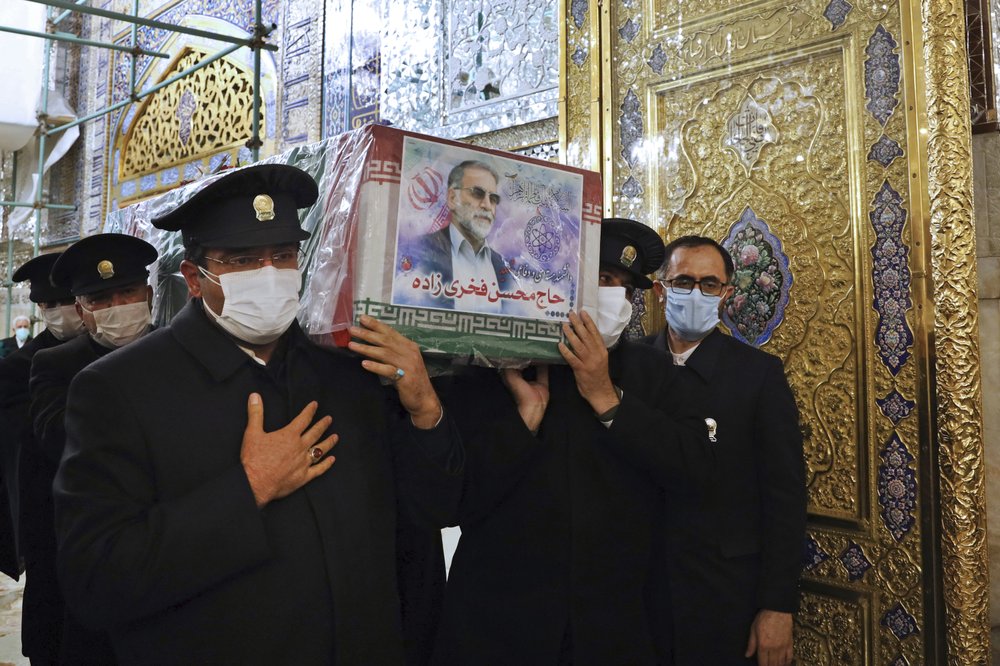Iran held a funeral service Monday for the slain scientist who founded its military nuclear program two decades ago, with the Islamic Republic’s defense minister vowing to continue the man’s work “with more speed and more power.”
An honor guard carried the casket containing the body of Mohsen Fakhrizadeh, who reportedly was gunned down in a military-style ambush Friday that Iranian officials have blamed on Israel.
Israel, long suspected of killing Iranian nuclear scientists over the last decade, has declined to comment on the attack.
Defense Minister Gen. Amir Hatami gave a speech after kissing Fakhrizadeh’s casket and putting his forehead against it. He said Fakhrizadeh’s killing would make Iranians “more united, more determined.”
Hatami also declared the assassination a “stupid” crime and vowed to hunt down and execute the perpetrators.
“The enemy knows and I, as a soldier, tell him, no crime, no terror and no stupid act will go unanswered in the eyes of the Iranian people, and we will surely pursue the criminals behind it to the end, and they will be executed,” Hatami said.
“The enemy knows he cannot commit a crime without a response from the Iranian people, the blood of the martyr Fakhrizadeh will be remembered forever, the enemy has made a mistake in killing him.”
Hatami also criticized countries that hadn’t condemned Fakhrizadeh’s killing, warning: “This will catch up with you someday.”
Hatami also called the nuclear arsenal of the U.S. — and the stockpile of atomic bombs Israel long has been suspected of holding — “the most dangerous threat against humanity.”
Fakhrizadeh headed Iran’s so-called AMAD program, which Israel and the West have alleged was a military operation looking at the feasibility of building a nuclear weapon. The International Atomic Energy Agency says that “structured program” ended in 2003. U.S. intelligence agencies concurred with that assessment in a 2007 report.
Israel insists Iran still maintains the ambition of developing nuclear weapons, pointing to Tehran’s ballistic missile program and research into other technologies. Iran long has maintained its nuclear program is peaceful.
Monday’s service took place at an outdoor portion of Iran’s Defense Ministry in Tehran, with officials including Revolutionary Guard chief Gen. Hossein Salami, the Guard’s Quds Force leader Gen. Esmail Ghaani, civilian nuclear program chief Ali Akbar Sahei and Intelligence Minister Mamoud Alavi. They sat apart from each other and wore masks due to the coronavirus pandemic as reciters melodically read portions of the Quran and religious texts.
Mourners later buried Fakhrizadeh in the courtyard of Imamzadeh Saleh mosque in north Tehran.
Overnight, the United Arab Emirates, which just reached a normalization deal with Israel, issued a statement condemning “the heinous assassination.” The UAE, home to Abu Dhabi and Dubai, warned it “could further fuel conflict in the region.”
Last year, the UAE found itself in the middle of an escalating series of incidents between Iran and the U.S. Though long suspicious of Iran’s nuclear program, the Emirates has said it wants to de-escalate the crisis. The UAE just started passenger air service to Israel and Israelis are expected to vacation in the country over Hanukkah in the coming days.
In response to the killing, Iran’s parliament has begun a review of a bill that would stop inspections by the International Atomic Energy Agency. The nuclear watchdog has provided an unprecedented, real-time look at Iran’s civilian nuclear program following the country’s 2015 nuclear deal with world powers.
The deal has unraveled after President Donald Trump’s unilateral 2018 withdrawal of the U.S. from the accord. Iran’s civilian atomic program has since continued its experiments and now enriches a growing uranium stockpile up to 4.5% purity.
That’s still far below weapons-grade levels of 90%, though experts warn Iran now has enough low-enriched uranium to reprocess into fuel for at least two atomic bombs if it chose to pursue them. The proposed bill reportedly also would require Iran’s civilian atomic program to produce at least 120 kilograms (265 pounds) of uranium enriched to 20% — a short technical step to 90%.
Iran’s 290-seat parliament is dominated by hard-liners who likely would support the bill. It ultimately would have to be approved by Iran’s Guardian Council. Supreme Leader Ayatollah Ali Khamenei also has final say on all matters of state.
(YWN Israel Desk – Jerusalem & AP)











